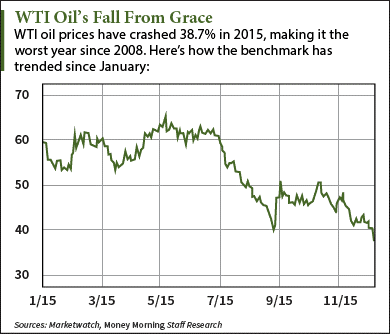That's the biggest question investors are asking right now as oil hovers at its lowest level since February 2009.
At 8:50 a.m. today (Tuesday), WTI crude oil prices were down 2.3% and trading at $36.79 a barrel. The U.S. benchmark cratered 5.8% yesterday to settle at $37.65 - the largest one-day loss since September. Futures are now down 38.7% in 2015.
Brent crude oil prices also saw early morning volatility. The global benchmark fell 2% to $40.36 a barrel. It's now down 39.5% for the year.
Oil prices kept falling today as investors remain wary of a global supply glut after the Dec. 4 OPEC meeting. Last Friday, the 12-member cartel decided to raise its production ceiling to 31.5 million barrels a day. The move is part of OPEC's strategy to produce at a record pace to protect market share and hurt competitors.
The decision to raise the ceiling was a surprise and sent prices below the $40 mark. That leaves investors on edge moving into 2016.
With all of this bearish supply news pulling down prices, energy investors are wondering if oil prices will keep falling as we move into 2016...
Will Oil Prices Keep Falling Next Year?
According to Money Morning Global Energy Strategist Dr. Kent Moors, OPEC's excess production will only have a short-term effect on prices.
That's because increasing global demand will overshadow any supply boost and send prices on a long-term rebound...
The International Energy Agency (IEA) forecasts global demand to hit 96.7 million barrels a day by the fourth quarter of 2016. That's up from a projected average of 95.5 million barrels during the fourth quarter of this year.
"Supply won't be able to keep up with rising demand," Moors explained back in September. "The fundamentals paint a picture of tightening oil supply at a time of increasing demand."
And demand will be even stronger in the United States as we see a huge drop-off in domestic production next year.
You see, the average U.S. oil well produces at peak volume within the first 18 months it's online. The majority of these wells are now starting to see a decline in production. That drop-off makes sense considering oil prices started crashing about 18 months ago in July 2014.
[mmpazkzone name="in-story" network="9794" site="307044" id="137008" type="4"]
"We are now well into the impending normal extraction rate declines from the latest deep wells," Moors said. "This will translate into a reduction of surpluses in the American market."
Although oil prices will see short-term drawbacks, they will stabilize and move higher over the long term.
Alex McGuire is an associate editor for Money Morning who writes about energy. Follow him on Twitter for all of the biggest updates on oil and gas prices.
Like us on Facebook: Money Morning
The End of the Petrodollar: Since 1973, the global oil market has operated by the "petrodollar" system, wherein exports around the world are priced in U.S. dollars. Now foreign oil deals are threatening to dismantle that system. What they plan to put in its place could destroy the U.S. dollar, ultimately leading to total economic collapse...



 Will oil prices keep falling
Will oil prices keep falling